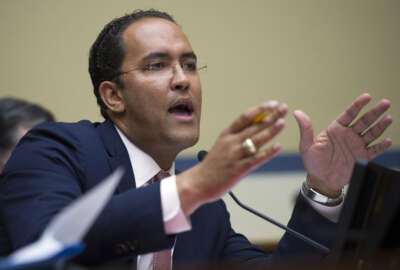
‘Floodgates’ open for DoD’s new digital service
After slow start, the Defense Digital Service is now working on projects ranging from GPS to travel reimbursements.
Eight months ago, when Defense Secretary Ash Carter formally established the Defense Digital Service to rethink struggling DoD IT systems, its staff of government outsiders had no office and no actual assignments.
That changed almost immediately when they began knocking on doors of mid-to-senior-level leaders in the Pentagon and asked whether the inhabitants had any IT problems that needed fixing. The team is now seriously involved in projects ranging from the Pentagon’s collection and reporting of data on sexual assault to the control systems that will manage the next generation of GPS to a cloud-based overhaul of the long-maligned Defense Travel System.
“It’s been an opening of the floodgates,” Chris Lynch, the digital service’s director, said at a technology conference organized by Defense One on Friday. “Since then, we’ve had tons of people showing up at our office to talk to us about the various challenges they’ve had. Some of them are IT professionals who tell us they’ve been waiting literally their entire careers for an office like this.”
Their optimism comes, perhaps, from the fact that the Digital Service has a direct pipeline to the Secretary of Defense. It functions as a “SWAT team” with “super powers,” Lynch said, adding that Carter himself approves each of its projects. That cachet makes it easier to gain waivers from standard IT policy and provides a fair amount of top-cover.
In the case of the Defense Travel System (DTS), the digital service decided it wanted to tackle the project even though the government’s measures of IT success aren’t showing any blinking red lights at the moment: DTS is rated as “low risk” on the federal IT dashboard, all of its existing projects are on-budget and almost all are on-schedule.
But the system — whose use is mandatory for all commercial travel expenses and reimbursement throughout the military — represents a major “pain point” for the millions of people who have to use it, Lynch said, and his team is mostly interested in projects that will have a broad impact.
“We want to modernize it and make it enjoyable to use,” he said. “I’ve personally been a victim of DTS, being left in places without tickets back. Our plan is to pilot a cloud-based, multi-tenant software-as-a-service solution, which is what would be perfectly reasonable and expected in the broader world as part of your corporate travel.”
Notwithstanding difficulties for travelers, a March DoD inspector general report also noted that DTS’ troubles in matching actual receipts with the reimbursements DoD made to its employees was a significant factor in the $415 million in errant travel payments the department made in 2014.
But Lynch emphasized that the Defense Digital Service, an offshoot of the U.S. Digital Service, is not interested in hostile takeovers of any of the IT development work the department already has underway. He acknowledged that none of the software developers it’s employed so far has any expertise in the mission areas they’re being asked to work in, so their projects can only succeed if they’re conducted with the buy-in of the government staffs already working on systems like DTS.
“We call it a tour of duty for nerds,” he said. “We try to use our commercial experience about how to use and ship products to turn around challenged or very strategic projects that are already going on. We’re not experts on digital security or GPS, but we know how to build very, very secure software and field it quickly. The magic starts to happen within the digital services when the people who are experts in writing code and developing products — not 20 years ago, but right now — are paired with the people who understand the mission. That’s when we can break apart whatever’s holding things up.”
Copyright © 2025 Federal News Network. All rights reserved. This website is not intended for users located within the European Economic Area.
Jared Serbu is deputy editor of Federal News Network and reports on the Defense Department’s contracting, legislative, workforce and IT issues.
Follow @jserbuWFED





